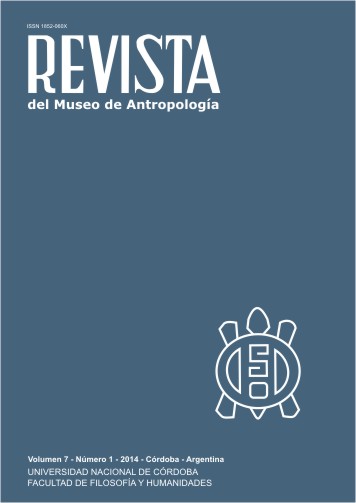Doing politics in the Club Juventud
DOI:
https://doi.org/10.31048/1852.4826.v7.n2.9188Keywords:
football, politics, articulation, elections, political practicesAbstract
The relationship between “football and politics” can be understood from multiple perspectives. We chose, this time, to do it from the participation of individuals, representatives of other areas, entering the plot of the institutional politics of a sports club; and see the difference that this situation makes towards the development of an interface between different spaces: the club, the political power of the town hall, and labor union politics. Given this framework, the paper also analyzes the practices and strategies that politicized individuals develop to gain executive positions in the club at election times. The data used as evidence of this development emerged during the fieldwork in a sports institution, a nationally renowned institution between 2004 and 2005 and mid-2007 until late 2009.Downloads
References
Auyero, Javier. 2001. La política de los pobres. Las prácticas clientelistas del peronismo. Manantial, Buenos Aires.
Bourdieu, P. 2007. O poder simbólico. Bertrand, Río de Janeiro.
Bourdieu, P. 1997. Razones Prácticas. Sobre la teoría de la acción. Anagrama, Barcelona.
Bezerra, M.1999. Em nome das “bases”. Política, Favor e dependencia pessoal. Relume Dumará, Rio de Janeiro
Frederic, S. 2004. Buenos vecinos, malos políticos. Moralidad y política en el Gran Buenos Aires. Prometeo, Buenos Aires.
Hermitte, E. y Herrán, C. 1977. Sistema productivo, instituciones intersticiales y formas de articulación social en una comunidad del noroeste argentino. En Hermitte, E. y Bartolomé, L. (orgs.). Procesos de articulación social. Amorrortu, Buenos Aires.
Lande, C. 1977. The Dyadic Basis of Clientelism. In Schmidth, S. et. alii (Org..). Friends, followers and factions: a reader in political clientelism. University of California Press, Berkley.
Mayer, A. 1980. La importancia de los cuasi-grupos en el estudio de las sociedades complejas. In Banton, M. (Org.). Antropología social de las sociedades complejas. Alianza, Madrid.
Moreira, V. “La política de los otros”. El juego de los hinchas, entre trayectorias y posiciones legítimas”, en PUBLICAR en Antropología y Ciencias Sociales. N º X. Junio 2011. Colegio de Graduados en Antropología de la República Argentina ISSN 0327-6627. 107-127 p.
Palmeira, M. 2003. Política, facciones y votos en Rosato Ana y Fernando Balbi (eds.): Representaciones sociales y procesos políticos. Estudios desde la antropología social. Buenos Aires, Antropofagia.
Palmeira, M. y Heredia, B. 1997. Política ambigua. In BIRMAN, Patricia et. alii (Org.) O mal à Brasileira. UERJ, Rio de Janerio.
Soprano, Germán. 1999. Formas de organización y socialización en un partido político. Etnografía sobre facciones, alianzas y clientelismo en el peronismo durante una campaña electoral. Tesis de Doctorado. Misiones: Universidad Nacional de Misiones.
Soprano, G. 2003. A favor de una etnografía sobre clientelismo político y peronismo. Desarrollo Económico, Buenos Aires, vol 42, n 167, p. 483-488, octubre-diciembre
Wolf, E. 1980. Relaciones de parentesco, de amistad y de patronazgo en las sociedades complejas. In Banton, Michael (Org.) Antropología social de las sociedades complejas. Alianza, Madrid.
Downloads
Published
Issue
Section
License
Those authors who have publications with this Journalaccept the following terms:
a. Authors will retain their copyrights and guarantee the journal the right of first publication of their work, which will be simultaneously subject to the Creative Commons Attribution License (Licencia de reconocimiento de Creative Commons) that allows third parties to share the work as long as its author and his first publication in this journal.
b. Authors may adopt other non-exclusive licensing agreements for the distribution of the version of the published work (eg, deposit it in an institutional electronic file or publish it in a monographic volume) provided that the initial publication in this journal is indicated.
c. Authors are allowed and recommended to disseminate their work on the Internet (eg in institutional telematic archives or on their website) before and during the submission process, which can lead to interesting exchanges and increase citations of the published work. (See The Effect of Open Access - El efecto del acceso abierto)












